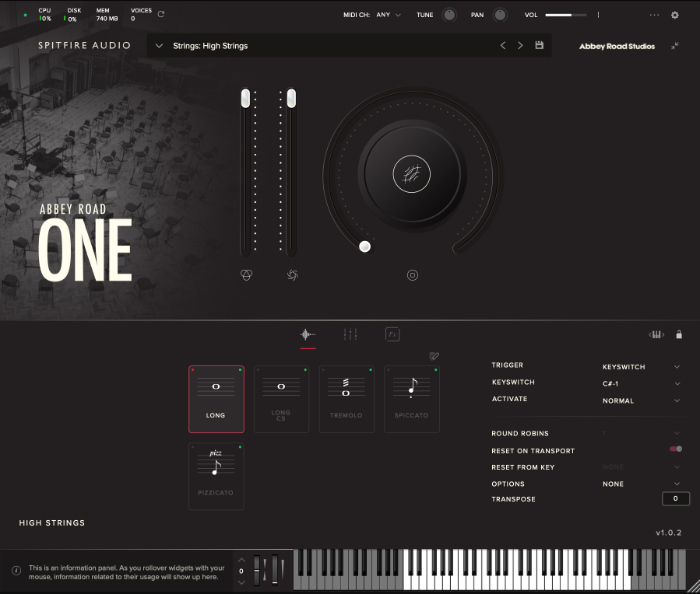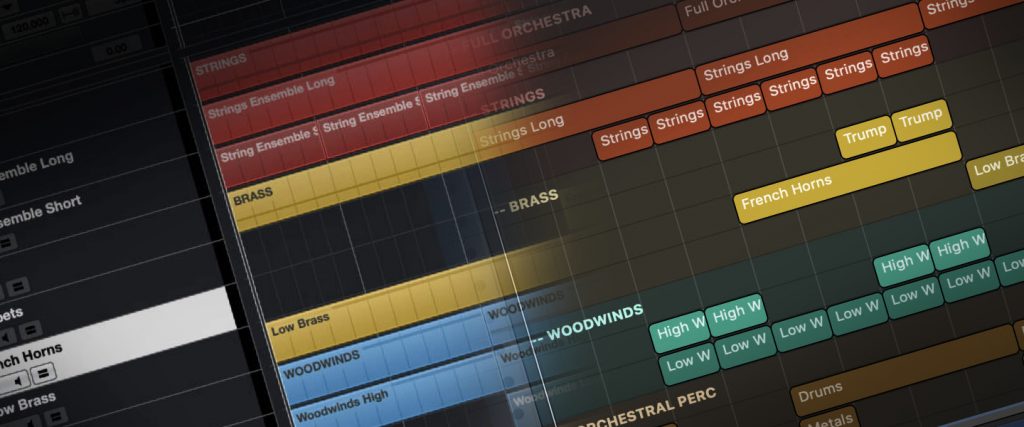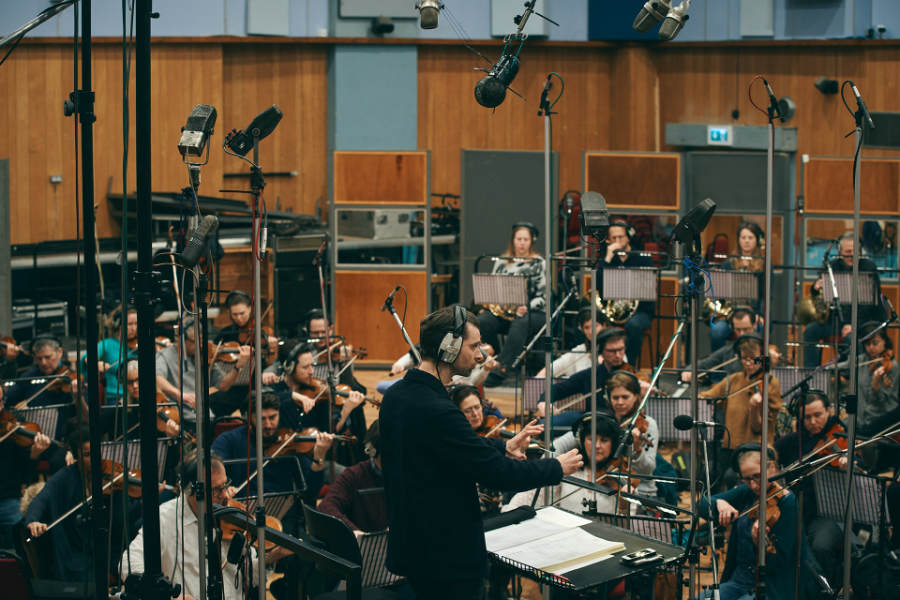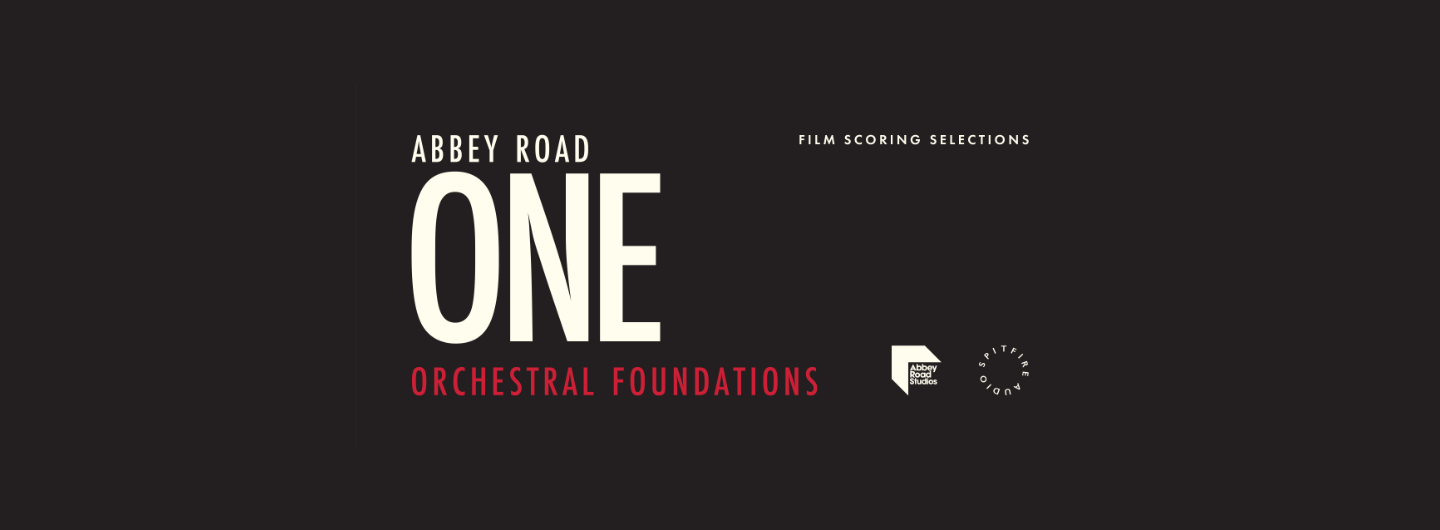Abbey Road Studios – a name not only synonymous with the sound of legendary albums by The Beatles, Amy Winehouse, or Adele but just as much as with award-winning film soundtracks for franchises like Harry Potter, Star Wars, or The Lord of the Rings.
Abbey Road One: Orchestral Foundations is Spitfire Audio’s very first collaboration with the iconic British Abbey Road Studios. According to the developers, it is also only the first installment in an upcoming series of sample libraries recorded at Abbey Road’s fabled Studio One.
Abbey Road One seeks to capture the highly-praised sound that Studio One has infused countless orchestral film soundtracks with. This includes featuring the same players, instruments, microphones, and gear that was used on scores by film composer greats like John Williams, Howard Shore, or Alan Silvestri.
OVERVIEW
Abbey Road One: Orchestral Foundations puts a complete, 90-player symphonic orchestra at your fingertips, recorded in the same world-class scoring stage like many of the most iconic soundtracks of film history. With Abbey Road One, British sample library developer Spitfire Audio wants to provide pop music producers and film composers alike with an easy-to-use orchestral scoring tool.
The library features all of the four standard symphonic orchestral instrument sections strings, brass, woodwinds, and percussion, and offers them to you in a pre-orchestrated fashion. This means you don’t have access to all of the individual instrument groups of a section like violins, celli, basses, and so on, but instead control more condensed, overarching patches. These include:
- Full Orchestra
- High Strings
- Low Strings
- Trumpets
- Horns
- Low Brass
- High Woodwinds
- Low Woodwinds
- (Untuned) Percussion
- Tuned Percussion
- Drums
- Metals
Abbey Road One is powered by Spitfire Audio’s custom-designed VST/AU/AAX plugin and features a sample size of roughly 70 GB. If you’re planning on purchasing the library, make sure to have enough free disk space available.
Although Abbey Road One: Orchestral Foundations doesn’t provide you with access to all the individual instruments like their Spitfire Symphonic Orchestra or BBC Symphony Orchestra libraries do, we will probably be able to extend our possibilities when the first expansion packs are published in early 2021. With “Legendary Low Strings” and “Sparkling Woodwinds”, Spitfire Audio already announced the first two expansions, so it seems like users will get their hands on the more detailed facets of the orchestra little by little. The price for the upcoming expansion packs will be $49/€49.
THE ABBEY ROAD ONE PLUGIN
Similar to other recent Spitfire Audio libraries like the BBC Symphony Orchestra, Hans Zimmer Strings, or Eric Whitacre Choir, Abbey Road One comes as its own, dedicated plugin. The interface structure follows that of the other plugins quite closely. The top half provides you with the most essential control parameters like expression, dynamics, and a freely assignable circular FX slider. This slider can either control the reverb amount, tightness, release, or vibrato. The bottom half features all of the loaded articulations of a patch, as well as a microphone mix section and an FX tab. On the lower right side of the interface, you can control a selection of utility parameters like keyswitches, keyswitch trigger behavior, round robins, and transposition options.

Articulations
With the exception of the percussion and parts of the brass section, Spitfire Audio has pre-orchestrated all of the individual instrument groups of each section into broader instrument patches, e.g. High Strings, Low Woodwinds, etc. Each of these patches contains a collection of up to 7 articulations you can choose from and switch between using MIDI keyswitches.
By default, any patch loads up with all of the available articulations activated. However, the plugin allows you to easily deactivate individual articulations so that you only have loaded what you really need. You can also save user presets that contain just the articulations of your choice for future use.

As outlined before, each articulation can be assigned to any key on your keyboard or controller so that you can set up your very own keyswitch ranges and functionality.
Although the brass section is a bit more finely structured into trumpets, french horns, and low brass (trombones, bass trombones, contrabass trombone, tuba, & contrabass tuba), it contains a similar articulation structure as the other patches.
The percussion section is put together in a slightly different way. Although you, again, get grouped patches like drums, untuned & tuned percussion, metals, and ensembles, they contain individual, “keyswitch-able” instruments instead of articulations. The percussion section is quite extensive and provides you with all the standard orchestral instruments like timpani, bass drums, snares, tom-toms, cymbals, and more. The tuned percussion section contains a beautiful sounding glockenspiel and xylophone.
Each articulation is carefully multi-sampled and therefore contains various round-robins and dynamics per note. This procedure tremendously reduces the dreaded machine gun effect that can occur when you play fast repetitions with an instrument that has only a limited number of samples. Without multiple round robins present, the sound you get is very static and robotic. To save CPU resources or achieve a distinct effect, you can limit the round robins of each articulation if you want to.
Microphone Mixes
In order to capture the elusive sonic features of Abbey Road Studio One in its full glory, the 90-piece orchestra was recorded using an elaborate array of different microphones at various positions. Apart from the standard close, tree, ambient, and outrigger positions, Spitfire Audio also provides you with spill mics for enhanced realism as well as several mic mixes designed by four-time GRAMMY® Award-winning sound engineer Simon Rhodes (Avatar, Hugo, Harry Potter).

There are two Main Mixes that differ in color and sense of space, which are created by mixing the individual microphone signals. These are your go-to mic mixes for cinematic music and film scoring. Two additional Pop Mixes give you a more focused sound that works very well with pop, rock, and electronic music arrangements. Finally, you get two Vintage Mixes, which are created from rare RM1B ribbon microphones that ran through Abbey Road’s legendary vintage TG Desk. These mixes will give you a distinct vintage scoring stage flavor reminiscent of the golden age of Hollywood film.
You can freely choose and blend between all of these mic positions and mixes, thus creating your very own tone and room sound tailored to your project. Mic positions you don’t need can easily be turned off and purged from memory with the click of a button.
ABBEY ROAD ONE – ORCHESTRAL TEMPLATE

Just in time for the release of Abbey Road One, we created custom-designed orchestral templates for the library for both Cubase & Logic Pro X. These templates contain all of the instruments and articulations of Abbey Road One pre-loaded and neatly laid out, structured, color-coded, and pre-routed, so you can start getting creative right from the get-go.
With version 1.1 of our template for Abbey Road One, we’re also including a second template file that is based around so-called Expression Maps (Cubase) and Articulation Sets (Logic Pro X). Expression Maps and Articulation Sets are unique DAW features that allow you to control articulations or playing styles of an instrument without having to draw in MIDI notes or keyswitches.
In order to run our templates correctly, you will need:
- a full version of Logic Pro X (version 10.5.1 or higher) or Cubase (version 10 or higher)
- a full version of Spitfire Audio’s Abbey Road One: Orchestral Foundations (version 1.0.2 or higher)
Head over to our new shop to get access to our Orchestral Templates for Abbey Road One.
THE SOUND OF ABBEY ROAD ONE
To no surprise really, the orchestral instruments captured in the iconic Abbey Road Studio One just sound magnificent. The sonic structure and space that the scoring stage adds to instruments makes them sing and shine in a multitude of ways.
If you’re used to listening to film scores like those of Star Wars or Harry Potter by John Williams (which were recorded at Abbey Road), you may be struck by how close the sound of the sampled orchestra gets to the “original” both in tone and three-dimensionality.
When I was first playing around with the library, I instantly felt like having the real deal right at my fingertips. If you’re not familiar with the unique Abbey Road sound, what you get is a perfectly balanced, lush, and expensive-sounding orchestral tone that works well with any kind of cinematic or pop music.

The dynamic range of most of the instruments is extraordinary, given that you make good use of the modulation sliders and different velocities that control the dynamic layers. In contrast to some other orchestral products by Spitfire Audio, Abbey Road One is equipped with 5 instead of 3 dynamic layers, which heavily enhances the library’s expressiveness.
I particularly love the stately and noble-sounding brass section, first and foremost the powerful french horns and the growly low brass group. The strings section can deliver anything from soft and subtle to wonderfully soaring and dense. The woodwinds sound clear, pronounced, and powerful in the short articulations. The various percussion instruments are captured with much detail and really come to life if you allow them to resonate in the room.
One articulation type that sounds amazing throughout all of the instrument sections is the expressive swell articulation offered in different lengths. I have a strong suspicion we will hear those in many upcoming scores and soundtracks to come.
CONCLUSION
Abbey Road One: Orchestral Foundations clearly lives up to the hype it’s been creating throughout the composer scene. Although not presenting something entirely new and groundbreaking, Spitfire Audio managed to successfully capture the sought-after cinematic room tone of Abbey Road’s Studio One and thus offers you an authentic and comprehensive orchestral toolkit.
Given the condensed nature of the instruments offered, this first edition of the Abbey Road series is probably geared more towards pop, rock, and EDM producers than it is to professional, orchestral arrangers. Then again the rather high entry price for this product might be a bit off-putting for amateur producers.
The layout of articulations and instruments provides you with an easy start into the world of orchestral music production, without requiring you to know how to build an orchestral arrangement voice by voice. On the other hand, even experienced film music composers can surely benefit from Abbey Road One as an easy to use and marvelous sounding sketching tool.
I personally like to see Abbey Road One: Orchestral Foundations as the basic set to get started which can then be expanded according to your compositional needs by means of the upcoming expansion packs.
Abbey Road One: Orchestral Foundations is available for €449 through Spitfire Audio’s online store.
Pros
- Great sound quality
- Expressive dynamic range
- Flexibe room tone control
- Easy usability
- Expandability through future expansions
Cons
- Price entry point quite high for the intended target group
- No access to individual instruments
- Restricted selection of articulations


0 comments on “Spitfire Audio – Abbey Road One (Review)”